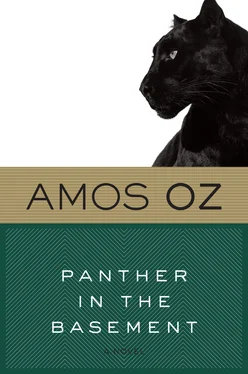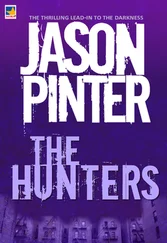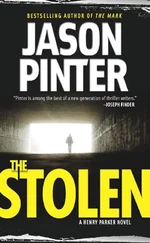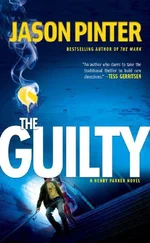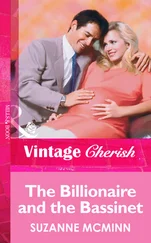Yes indeed.
Definitely.
And decidedly.
I would take up his suggestion.
I would meet him in the Orient Palace, and then, under the guise of swapping English and Hebrew lessons, I would cunningly extract from him vital classified information about the deployment of the enemy troops and the schemes of the repressive regime. By doing this I would be a thousand times more useful to the Underground than by running away or even by snatching a single pistol. Henceforth I was a spy. A mole. A secret agent disguised as a child interested in the English language. From this moment on I would act as in a game of chess.
Father stood in the doorway and said in his slow English, with his Russian rs that sounded like roller skates scraping over rough concrete:
"Thank you, Officer, for bringing us back our stray lamb. We were beginning to be worried. Particularly my wife. We are most grateful."
"Dad," I whispered, "he's all right. He likes Jews. Give him a glass of water, and watch out, he understands Hebrew."
My father didn't hear. Or else he decided to take no notice. He said:
"And as for the little scamp, don't worry, sir, we will deal with him. Thank you once again. And good-bye, or shalom, peace, as we Jews have been accustomed to say for thousands of years, and we still mean it, despite all we have undergone."
Sergeant Dunlop replied in English, but changed to Hebrew halfway through:
"The lad and I were talking on the way. He's a dear, bright lad. Don't be too hard on him. With your permission I, too, will use the Hebrew word shalom. Peace. 'Peace, peace to him that is near, and to him that is far off.' " And all of a sudden he offered me his plump hand that my shoulder had grown accustomed to and still wanted. And, winking, he added in a whisper:
"Orient Palace. Six o'clock tomorrow."
I said, "Good-bye. Thank you." My heart rebuked me: "Shame on you, hellenizer, lackey, coward, bootlicker, why in heaven's name are you saying thank you to him?" Suddenly a wave of self-respect swept through me like the brandy that my father once let me sip to cure me of ever wanting it again. Everything I had ever been taught about generations of downtrodden Jews, and Humphrey Bogart the proud captive, all stuck in my throat, and I thrust my clenched hand deep into my pocket. I left the enemy's hand hanging surprised in midair, until he had to give in and convert the handshake into a kind of feeble wave. He tipped his head and left. My dignity was intact. So why did I feel once again that taste of treachery in my mouth, as though I had been chewing soap?
Father closed the door. Still standing in the hallway, he said to my mother:
"Please keep out of this."
And quietly he asked me:
"What do you have to say for yourself?"
"I was late. I'm sorry. The curfew started. I was already on my way home when that policeman caught me."
"You were late. Why were you late?"
"I was late. I'm sorry."
"So am I," said Father sadly, adding:
"Yes indeed. I am sorry, too."
Mother said:
"There was an incident in Haifa. A boy your age was out in the curfew. The English caught him, accused him of sticking up bills, sentenced him to fifteen strokes. Of the lash. Two days later his parents found him in some Arab hospital, and his back I don't want to describe what state—"
Father said to her:
"Would you please let me finish?"
And to me he said:
"Yes indeed. Kindly take note: You are not to leave your room till the end of this week except to go to the bathroom. So you will have supper by yourself. That way you will have plenty of free time to reflect honestly on what happened and also on what might have happened. Added to which Your Lordship will have to contend with an economic crisis, because your pocket money is frozen until the first of September. Besides which, the aquarium and the trip to Talpiot are definitely out of the question. Wait. We haven't finished yet. Lights-out this week is put forward from a quarter past ten to nine o'clock. Your Excellency undoubtedly understands the connection: it is so that you can ponder on your behavior in the dark. It has been definitely established that, in the dark, a rational man reasons with himself far more thoroughly than with the light on. That is all. Your Lordship will kindly take to your room this instant. Yes indeed. Without any supper. No, I must ask you once again not to interfere: This is between me and him."
After I was released from house arrest, I suggested to Ben Hur that he call a staff meeting in the FOD HQ, our hideout in the Tel Arza Woods. Without going into details, I reported on my discovery of a vital source of intelligence and requested authorization to proceed with an espionage assignment. Chita Reznik said:
"Oho!"
Ben Hur shot Chita a foxy khaki look and said neither yes nor no, and did not look at me. Finally he addressed his fingernails:
"The High Command must be kept in the picture at all times."
I interpreted these words as a specific authorization to undertake the mission. I said:
"Definitely. Once there is a picture, that is." And I pointed out that even in Panther in the Basement Tyrone Power was given a free hand, wasn't he, to disappear in the fog and assume and discard identities at his sole discretion. Chita said:
"That's right. And he turned into a diamond smuggler and then into a circus owner."
"A circus," Ben Hur said. "That's just right for Proffy. I'm not so sure about the panther in the basement, though."
I never imagined that I would be put under surveillance. That the Internal Security squad would swing into action that very day: Ben Hur hated not knowing. He had an unquenchable thirst. There was a hint of thirst in his face, his movements, his voice. For example, when we played soccer (he was the right-half, I was the commentator), we were amazed during halftime to see how Ben Hur could down six or seven glasses of fizzy lemonade one after the other, then drink water from the tap, and at the end still look thirsty. Always. I can't explain it. Not long ago I bumped into him while waiting for an El-Al flight; he was wearing a business suit and crocodile-skin shoes and had an expensive raincoat folded over his arm and a travel bag festooned with buckles. He was not called Ben Hur Tykocinski any more; his name was Mr. Benny Takin, and he owns a chain of hotels, but he still looks thirsty.
Thirsty for what? I wish I knew.
It may be that such people are condemned to wander forever in an inner desert, with arid yellow dunes, shifting sands, a wilderness. Many waters cannot quench it, nor can the floods drown it. To this day I am fascinated by such people, just as I was when I was a child. But with the passage of the years I have learned to beware of them. Or, rather, not so much to beware of them as to beware of being fascinated by them.
That Friday afternoon I slipped away to the Orient Palace Café. As I have already said, despite its name this was actually a shack half-buried in a tangle of passionflower. It wasn't even in East Jerusalem; it was in West, in one of those little lanes of slouchy old German villas behind the army camp on the way to Romema. These secretive, thick-walled houses had arched windows, tiled roofs, cellars and attics, water cisterns, and walled gardens whose leafy trees cast a gentle, foreign shade in the courtyards, as though you had reached the frontiers of a promised land whose inhabitants led quiet, peaceable lives, a promised land you could see only from a distance but never enter.
On my way to the Orient Palace I made various detours through backyards, across empty lots, and, to be on the safe side, I made a further loop to the south around the Takhkemoni School. Every now and again I took a quick look over my shoulder to make sure that I had managed to shake off anyone who might be shadowing me. I also wanted to make the journey longer, because I had never accepted that a straight line is the shortest distance between two points. I said to myself:
Читать дальше
